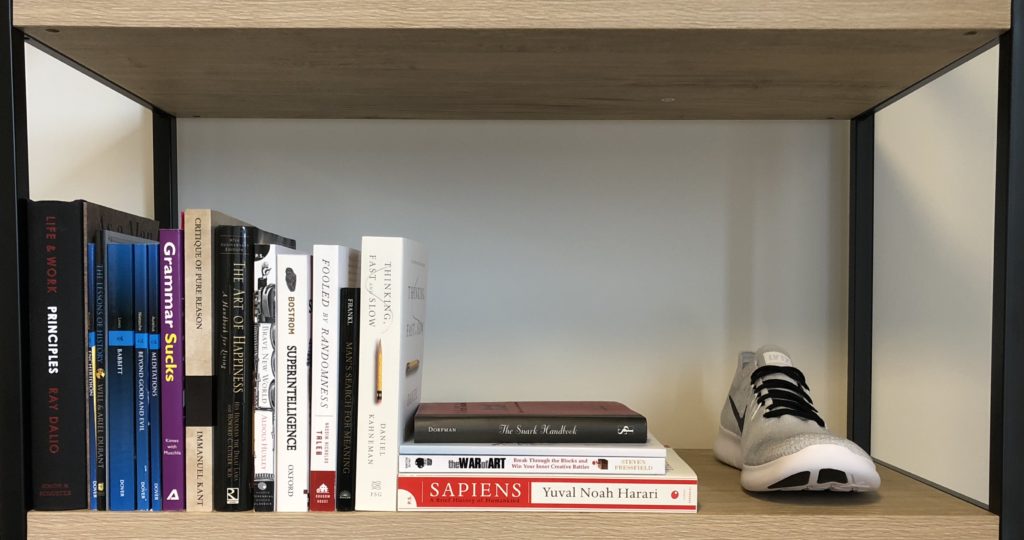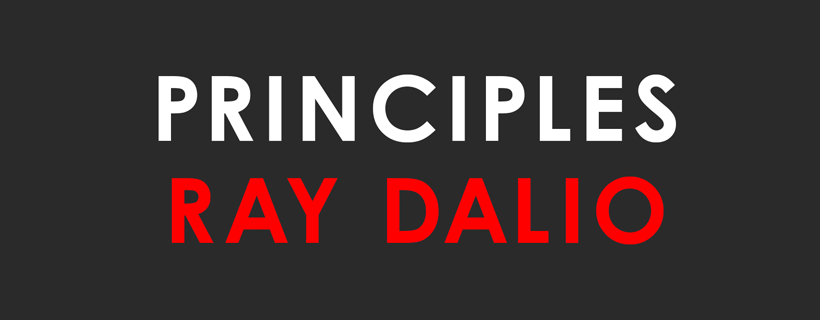Our conference room has a small library. In it are 19 books (so far) that are important to us in some way, be it a gift, a guide, a reminder, or a fundamental truth. We also have a small shoe collection. Anyway, one of those books is Ray Dalio’s Principles. As a way to self reflect, and to encourage you to explore these principles, we thought it would be helpful to grade ourselves on Dalio’s principles using his eight episode mini-series on YouTube.
Grading yourself objectively at anything is difficult, but we gave ourselves at least a passing grade in every category. Loup Ventures has a clear vision and an active culture built on values that we’ve embraced and developed over 10+ years of working together.
That said, we’re in year two of – as we like to say – building our firm for the next 40 years, so we have a lot of work left to do. Dalio’s principles provide a helpful framework against which we can measure our values, strengths, weaknesses, processes, and outcomes. And, as you’ll see, there are principles on which we need to reflect and make changes.

Think for yourself about what is true: C+
Dalio leads with the importance of establishing your own principles based on 1) what you want, 2) what you think is true, and 3) what you should do to achieve #1 in light of #2. At Loup, our compass is set – we know what we want (to be the leading frontier tech investment platform). We’re fairly clear on what we think is true and have shown the courage to act on it. The one issue we’ve had here is that by combining three persistent founders with the reality that this is our first fund, which will lay the groundwork for future funds, we can sometimes be slow to disagree and commit. We sometimes wrestle with decisions for too long by over-thinking and over-worrying instead of moving forward with confidence based on our principles. Recognizing this will allow us to improve over time.
[center]https://youtu.be/dKz095P7LdU[/center]Embrace reality and deal with it: B
“Truth is the essential foundation for producing good outcomes,” explains Dalio. We’ve made a habit of looking to nature as a guide to the fundamental truths of reality. Just recently, we made an investment in the artificial intelligence space based on this very habit. Embracing reality and our mistakes, especially as a team, requires radical honesty, one of our four core values. Moving forward, we can improve at reflecting on our mistakes and the problems we encounter in order to evolve.
[center]https://youtu.be/Tfrrubw7pcE[/center]Use the five-step process to get what you want out of life: A-
It takes a lot of practice to do it well, but our weekly partners’ meeting gives us the opportunity to engage in Dalio’s five-step process: 1. Know your goals and run after them; 2. Encounter problems that stand in the way of you getting to your goals; 3. Diagnose problems to get at their root causes; 4. Design a plan to eliminate problems; 5. Execute those designs.
We use an operating system for our business that requires a long-term vision, an annual plan, quarterly goals, and weekly to-dos. And during our weekly partners’ meetings, we have the opportunity to identify, discuss, and solve the issues standing in our way.
[center]https://youtu.be/ryD8lfSEGio[/center]The abyss: I (incomplete)
In our short history as a firm, we haven’t gone through the abyss, but we have faced failure. Frequently. We’ve failed to secure certain investors and form certain partnerships that we believed, and still believe, will be important to our future. The roller coaster of a startup (and investing in startups) is an insane ride because the risk/reward can feel so extreme. On the upswing, you think you’ll be a billionaire next year and on the downswing, you feel like you’ll be broke tomorrow. At Loup, we embrace learning from our mistakes. As we continue to build, we’ll need to be more systematic about reflecting on our failures. Some of our favorite thinkers across disciplines (investing, philosophy, sports) agree that pain is the best opportunity for growth, and we look forward to it.
[center]https://youtu.be/jNYN_QcpAUU[/center]Everything is a machine: B-
Dalio argues that everything works in cycles, “Everything is ‘just another one of those.'” The five-step process outlined above allows us to fine tune the Loup machine so that we are better prepared when we encounter a certain challenge again. However, as a startup, it’s incredibly difficult to take off our near-term, fear-based blinders to see our situation as “just another one of those.” According to PitchBook, 2017 saw more than 300 venture capital funds raised. We are, in fact, just another one of those.
We’re students of history – an important input for much of our research – but we need to do a better job reflecting on the patterns of history that affect our business, then implement processes to better anticipate them.
[center]https://youtu.be/Um4jnbZakbA[/center]Your two biggest barriers: B+
Dalio argues that your two biggest barriers are 1. your ego, and 2. your blind spot. We’ve been wrong a lot, which has helped us develop and institutionalize humility. As a group, we make it a habit to under promise and over deliver in all we do, lead with bad news, and acknowledge when we’re wrong. We’re building a culture that encourages people to embrace the difficult things, which goes hand in hand with barrier #2, your blind spot. Identifying and encouraging our team’s superpowers is a strength, and we need to be even more aggressive in positioning our team to focus on their strengths and avoid their weaknesses.
[center]https://youtu.be/CDmLI4zlBH0[/center]Be radically open-minded: A-
“Replace the joy of being proven right with the joy of learning what’s true.” We’ve embraced this principle through a value we call contrarian curiosity. By combining a respect for different opinions with endless curiosity built out of our research roots, we’re comfortable with looking at life through the perspective of others. We’ve set out to build something that each of us could not build on his own, and we’re building a team that further complements us. We will always strive to build a team with diverse perspectives and strengths for as long as Loup Ventures exists, but we’ve experienced the power of, as Dalio describes it, a shared mission with extraordinary people.
[center]https://youtu.be/J2Qrm9UB7qY[/center]Struggle well: B
“Success is not a matter of attaining one’s goals… [the] struggle toward personal evolution with others is the reward.” Disassociating the journey from the results is a difficult thing in such a results-driven business, but results can hide the reward that Dalio talks about: the journey. Our embrace of contrarian thinking lends itself well to enjoying the journey, and we regularly appreciate how lucky we are to be surrounded by great people on a shared mission, struggling together. We’ve even tried to operationalize decision making to remove emotion tied to the expectation of a result, particularly for investment decisions. Dalio’s challenge to struggle and evolve well is a journey that we are collectively honored to be on.
[center]https://youtu.be/nYY-1KxXnSg[/center]If you haven’t read Dalio’s Principles yet, we highly recommend it. Or at least read through the full list of principles, which he’s outlined here. Hopefully, this exercise has encouraged you to reflect on your own life and your own work through the lens of Dalio’s Principles. Embrace the open-minded struggle!
Disclaimer: We actively write about the themes in which we invest: virtual reality, augmented reality, artificial intelligence, and robotics. From time to time, we will write about companies that are in our portfolio. Content on this site including opinions on specific themes in technology, market estimates, and estimates and commentary regarding publicly traded or private companies is not intended for use in making investment decisions. We hold no obligation to update any of our projections. We express no warranties about any estimates or opinions we make.
